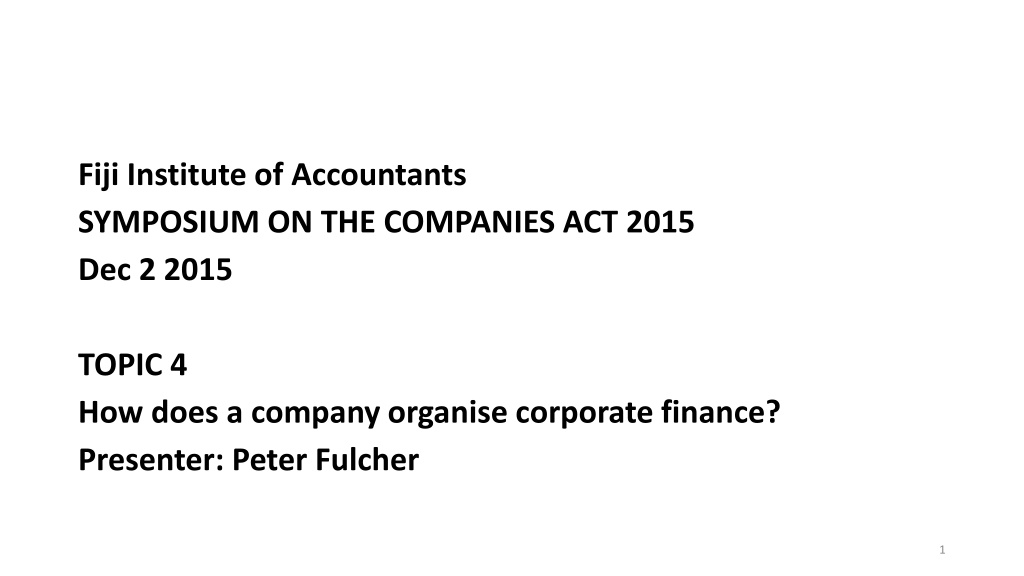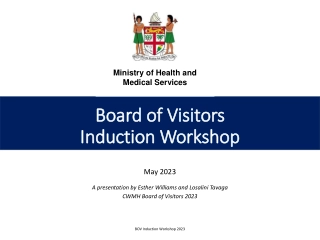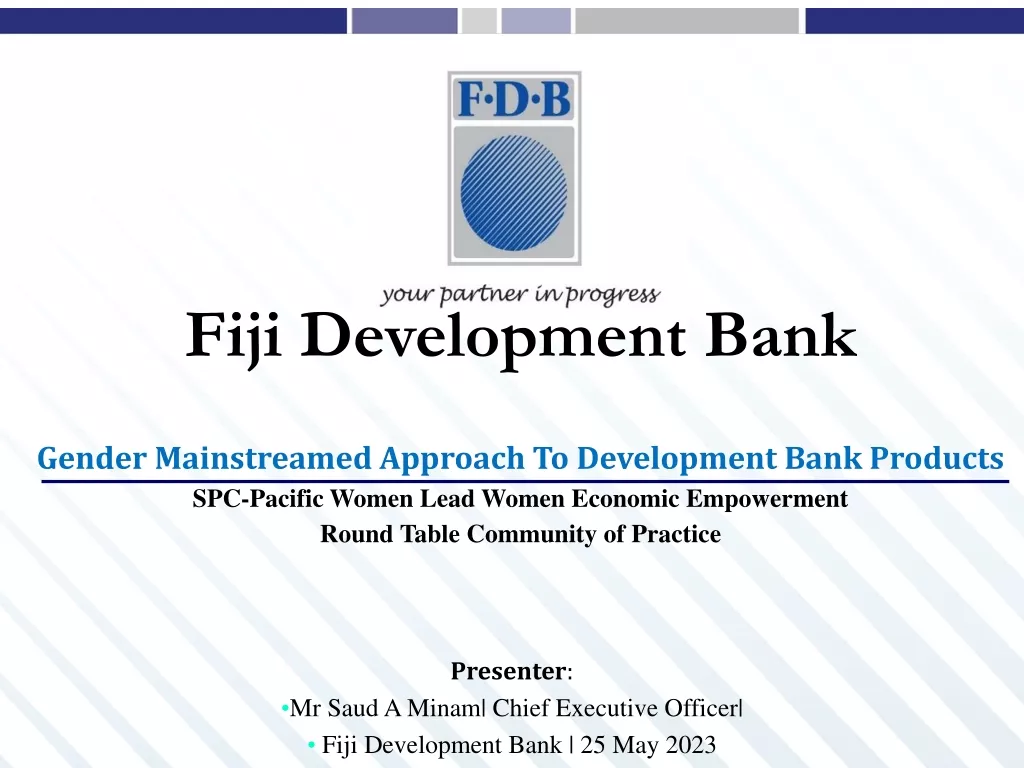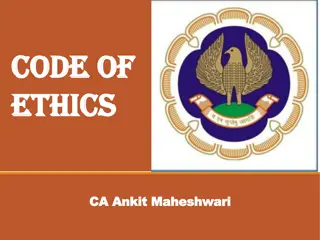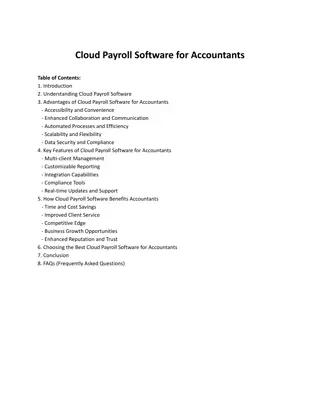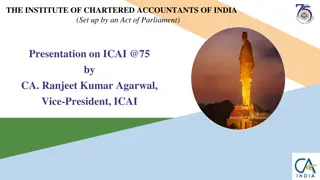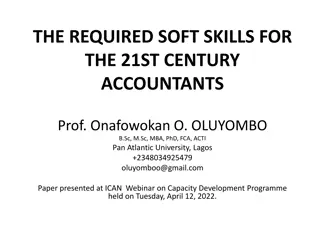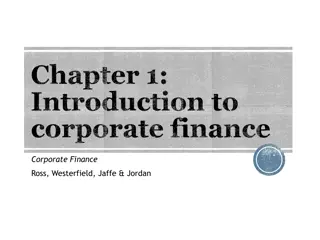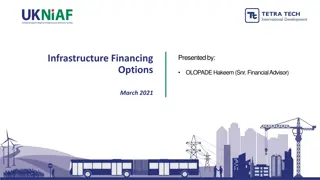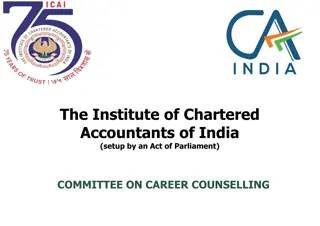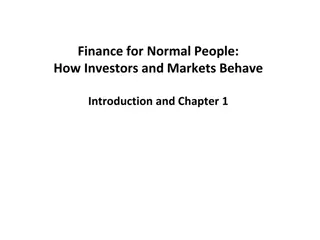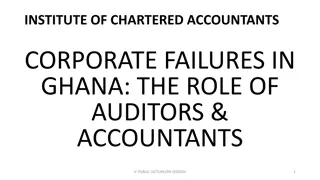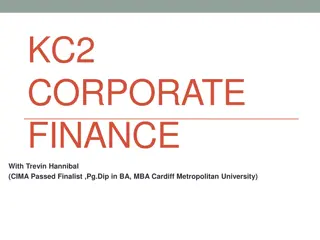Managing Corporate Finance: Insights from Fiji Institute of Accountants Symposium
Explore how companies organize corporate finance, including new provisions regarding shares, liabilities of members, and winding up processes as discussed by Peter Fulcher at the Fiji Institute of Accountants Symposium on the Companies Act 2015. The presentation delves into important aspects such as securities, shareholder rights, dividend distribution, and more.
Download Presentation

Please find below an Image/Link to download the presentation.
The content on the website is provided AS IS for your information and personal use only. It may not be sold, licensed, or shared on other websites without obtaining consent from the author. Download presentation by click this link. If you encounter any issues during the download, it is possible that the publisher has removed the file from their server.
E N D
Presentation Transcript
Fiji Institute of Accountants SYMPOSIUM ON THE COMPANIES ACT 2015 Dec 2 2015 TOPIC 4 How does a company organise corporate finance? Presenter: Peter Fulcher 1
Part One Part One Securities: some things new much that s tried and true 2
(new) provisions re shares (new) provisions re shares no, no, no - a number of nos. no mem no authorised cap no par value (s.193) (but articles may specify an authorised cap (s.194)) 3
(new) provisions re shares (new) provisions re shares cont cont limited by shares 3. Company Limited by Shares means a Company formed on the principle of having the liability of its Members limited to the amount, if any, unpaid on the Shares respectively held by them; PART 38 - WINDING UP GENERALLY Division 2 - Liability of Contributories 463. Subject to this Part, a Member is liable to contribute to the Company s Property to an amount sufficient to - (a) pay the Company s debts and liabilities 464. If the Company is a Company Limited by Shares, a Member need not contribute more than the amount (if any) unpaid on the Shares 4
(new) provisions re shares (new) provisions re shares cont cont no par value no share premium account (s.196) no par value no stock (s.195) no bearer shares (share warrant) (s.195) no capital redemption reserve fund (s.196) (redemption of redeemable pref shares s.203) terminology - share capital - issued capital - paid up capital 5
(new) provisions re shares (new) provisions re shares cont cont share attributes ordinary shares re meetings 143(1) Written notice of a meeting of a Company s Members must be given individually to each Member entitled to vote at the meeting re vote 161(1) Subject to any right or restriction attached to any class of Shares or any contrary provision in the Company s Articles of Association, at a meeting of Members of a Company with a share capital - (a) (b) on a poll, each Member shall have one vote for each Share they hold. re dividend 209. Each share in a class of shares in a Public Company shall have the same dividend rights unless - (a) the Company s Articles of Association provide for the shares to have different dividend rights; or (b) different dividend rights are provided for by Special Resolution of the Company. re winding up 490. [on winding up assets applied in paying creditors] and, subject to such application, must be distributed among the Members according to their rights and interests in the Company unless the Company s Articles of Association otherwise provide. 6
(new) provisions re shares (new) provisions re shares cont cont share attributes ordinary shares place it in the articles e.g. Schedule 2 standard form articles 31. Subject to this Articles of Association and to the terms of issue of Shares, all Shares attract the following rights, privileges and conditions (a) the right to receive notice of and to attend and vote at all General Meetings of the Company at one vote per Share; (b) the right to receive dividends; (c) in a winding up, the right to participate equally in the distribution of the assets of the Company (both capital and surplus), subject only to any amounts unpaid on the Share. 7
(new) provisions re shares (new) provisions re shares cont cont creating preference shares - share conditions stated in the articles - or special resolution (s.191) (c.f. 1983 Act) s.191(2) reminder of design features 8
(new) provisions re shares (new) provisions re shares cont cont share register co to maintain register of members / option holders /debentures / charges (s.81) register of members (s.82) - member s name, address, date (became member and allotted) - shares held (share no. or cert no.) - class - amount paid - whether fully paid - amount unpaid if any shares to be numbered (s.238(1)) unless all shares in the class fully paid (s.238(2)(a)) 9
(new) provisions re shares (new) provisions re shares cont cont share register cont no notice of trusts (s.250(8)) two exceptions: - mandatory notice that shares not held beneficially (s.82(3) and s.251) - co may consent shares held for a particular trust to be identified (s.250(7)) if not tracking particular share s issue price then be careful re 7% pref shares (also bonus share question) 10
(new) provisions re shares (new) provisions re shares cont cont share register cont filings return of allotment (s.211) (28 days) notice of change re register of members (ss.89 and 90) (p.f. 28 days) transfer proper instrument of transfer (s.242(1)) Regs to specify details (s.242(4)) 11
debentures debentures By which we mean . Question: When was the last time someone said; What s up in the debenture market? Answer: 1915 12
debentures (i.e. bonds) debentures (i.e. bonds) 1983 Act debenture includes debenture stock, bonds and any other securities of a company, whether constituting a charge on the assets of the company or not; 2015 Act 3. Debenture of an entity means any debenture stock, bond or any chose in action that includes an undertaking by the entity to repay as a debt, money deposited with or lent to the entity. The chose in action may, but need not, include a Charge over Property of the entity to secure repayment of the money. 13
debentures (i.e. bonds) debentures (i.e. bonds) cont cont 3. However, a debenture does not include (a) (b) an undertaking by a Financial Institution to repay money deposited with it, or lent to it, in the ordinary course of its banking business; (c) an undertaking to pay money under - (i) a cheque; (iii) bill of exchange company registers (s.81) 81(2) For the purposes of this Part, [Part 9 Co Registers] choses in action that fall into one of the exceptions in paragraphs (a), (b), (c) and (d) of the definition of Debenture in section 3 must also be entered into the register of Debenture Holders. surely not? 15
debentures (i.e. bonds) debentures (i.e. bonds) cont cont PART 27 DEBENTURES a trustee is classically used to hold security for bondholders now mandatory even if unsecured bonds public co must enter into trust deed prior to deb issue (s.295) (nothing new here e.g. Trust Indenture Act 1939 (USA)) function of Trustee - to hold security if any - to monitor issuer - to facilitate group decisions 16
debentures (i.e. bonds) debentures (i.e. bonds) cont cont duties of issuer - permit audit by trustee (s.302) - report to trustee any grant of security (s.306) - quarterly report to Trustee re - any act of default - material adverse development duties of Trustee to actively police covenants (s.313) also provisions for meeting of deb holders to issue directions to trustee 17
issues to the public issues to the public the general propositions: Private co cannot offer securities to the public. Public issues to utilize prospectus. 18
i issues to the public ssues to the public cont cont PART 26 - CAPITAL RAISINGS offer to the public to be made under a prospectus (s.283(1)) prospectus mandatory content (Schedule 3) and registered with Reserve Bank (s.284) exceptions: 283(3)(a) the offer is a personal offer and none of the offers results in Securities being issued to more than 20 investors having an aggregate issue price of more than $1 million in a 12 month period; 283(3)(b) the minimum amount payable for the Securities on acceptance of the offer by a person to whom the offer is made is at least $200,000; 19
issues to the public issues to the public cont cont further exceptions: - offer to certified sophisticated investor (s.283(3)(c)) - offer of debt securities by Financial Institution (s.283(3)(h)) - offer by Government, Government entity, Reserve Bank (s.283(4)) - rights offering by public company may be made under: - Prospectus (Sch 3) - or Offer Document (Sch 4) (s.285) 20
issues to the public issues to the public cont cont offer to the public defined both s.3 and s.283(2) 3. Offer to the Public includes the making of, an offer/invitation to any section of the public and notwithstanding that the offer is capable of acceptance only by each person to whom it is made but a bona fide offer or invitation is not taken to be an offer or invitation the public if it is - (b) a personal offer that is made to not more than 10 members of the public or if the personal offer is made to more than 10 members of the public, the offer is made with a view to it being accepted by not more than 10 members of the public in any 6 month period; (d) an offer or invitation issued to existing Members or Debenture Holders of a Company and relates to Shares in, or Debentures of, that Company; (e) an offer or invitation to subscribe for Securities where the amount to be purchased by each person to whom the offer or invitation is addressed is at least $200,000; 283(2) In this Part, [Part 26] offer to the public means an offer of Securities to - (a) any section of the public, however selected; (b) individual members of the public, however selected; 21
issues to the public issues to the public cont cont some tension s.3 and Part 26 3. but a bona fide offer or invitation is not taken to be an offer or invitation the public if it is (b) a personal offer that is made to not more than 10 members of the public or if the personal offer is made to more than 10 members of the public, the offer is made with a view to it being accepted by not more than 10 members of the public in any 6 month period; 283(3) An offer of Securities to the Public may be made without a Prospectus if - (a) the offer is a personal offer and none of the offers results in Securities being issued to more than 20 investors having an aggregate issue price of more than $1 million in a 12 month period; 22
issues to the public issues to the public cont cont some tension cont 3. but a bona fide offer or invitation is not taken to be an offer or invitation the public if it is (e) an offer or invitation to subscribe for Securities where the amount to be purchased by each person to whom the offer or invitation is addressed is at least $200,000; 283(3) An offer of Securities to the Public may be made without a Prospectus if - (b) the minimum amount payable for the Securities on acceptance of the offer by a person to whom the offer is made is at least $200,000; 23
p prospectus liability rospectus liability PART 43 - OFFENCES Division 4 - Offences in Relation to Disclosure Documents criminal penalty ($300) s.660 prohibits offer of securities under a disclosure document where DD - contains misleading or deceptive statement - or omits material required by Act - or new cirs post lodgement civil liability s.661 party suffering loss where contravention s.660 may recover the loss from - each director - the underwriter - named (consenting) expert 24
prospectus liability prospectus liability cont cont the due diligence defence s.662 not liable under s.661 re misleading or deceptive statement if - made all enquires that reasonable in the circumstances - believed the statement was not misleading or deceptive - did so on reasonable grounds re due diligence and reliance on third parties s.663 not liable under s.661 re misleading or deceptive statement or omission if - placed reasonable reliance on information given by another person 25
prospectus liability prospectus liability cont cont some confusion in ss.662 and 663 Due diligence defence for Bidder s Statement and Target s Statement 662. A person is not liable under section 661 because of a misleading or deceptive statement in a Prospectus or Bidder s Statement or Target s Statement if the person proves General defences for all Disclosure Documents 663(1) A person is not liable under section 661 because of a misleading or deceptive statement in, or an omission from, a Disclosure Document if the person proves 3. Disclosure Document means a Prospectus, Offer Document, Bidder s Statement or Target s Statement; 26
Part Two Part Two securities and what s really new 27
some background some background Foundation of limited liability is co laws one big idea: co is a legal person separate and distinct from its members. Hence the trilogy: - s.h. owns the co - co owns the business - s.h. does not own the business the business a collection of assets and liabilities 28
permissible? permissible? X Bankco guarantee (gratuitous) Aco business 29
permissible? permissible? Xco Bankco guarantee (gratuitous) Aco business but see s.117 30
What can the co hand to members? What can the co hand to members? profits 1983 Act divs only paid from profits (com law rule) 2015 Act s.207 Another way to put the point: - co cannot buy back its own shares - cannot provide fin assistance for purchase its own shares These the classical capital maintenance rules. 31
So whats So what s really really new in 2015 Act? new in 2015 Act? The capital maintenance rules are abandoned. co can buy back its own shares (Part 18 Div 3) co can provide fin assistance to party purchasing its own shares (Div 6) 32
Good idea? Good idea? Who was busy buying back their own shares in January 2008? Starts with L the case of Citibank 2006: repurchasing shares at $45-$55 per share. Late 2007: looking for Saudi bailout issuing 11% pref shares. Late 2008: shares trading $1 2009: issuing shares to US Govn at $2.50 per share (plus Govn guarantee of $300 billion of toxic assets ) (plus various emergency funding lines with Fed) (etc etc) 33
2014 2014 Glencore plc Glencore plc does $1 billion buyback does $1 billion buyback Sept 2015 announces fresh issue up to $2.5 billion Sept 2015 announces fresh issue up to $2.5 billion 34
the details on buybacks the details on buybacks buy-back procedure equal buy-back requires ord resolution (s.221) the creditor safeguards 221(1)(a) the Buy-back does not materially prejudice the Company s ability to pay its creditors; 221(1)(b) the Company will remain solvent immediately after the Buy- back of its own shares; materially prejudice means? 10/11/15 McDonalds announces $10 billion buyback 10/11/15 S&P announces downgrade from A- to BBB+ solvent means commercially solvent (s.3) 35
innovative finance The Deal Raj owns Xco Xco owns a tourist resort business Raj puts Xco up for sale Raj and Joeli agree price of $1 million Cash sale Joeli has $200,000 Both parties utilize holding cos 36
innovative financ innovative finance e cont cont the classic the classic transaction transaction Raj Joeli Raj Joeli guarantee Bank RHco Bank RHco JHco JHco mortgage $1 m $200,000 Xco Xco business business 37
innovative finance innovative finance cont cont innovative transaction 1 innovative transaction 1 utilising a buyback (s.221) Step one Xco borrows $500,000 from Bank borrowing secured on Xco s assets Xco buys back half of outstanding shares from RHco Step two JHco borrows $300,000 from Bank borrowing secured on JHco s assets plus guarantee of Joeli JHco purchases shares held by RHco for $500,000 38
innovative finance innovative finance cont cont Raj Joeli guarantee $300,000 mort $300,000 $500,000 + $500,000 Bank mort $500,000 business Bank RHco JHco Xco 39
innovative innovative finance finance cont cont innovative transaction 2 innovative transaction 2 utilizing financial assistance of Xco (s.233) Xco borrows $800,000 from Bank borrowing secured on Xco s assets funds onward lent to JHco ord resolution of Xco approves financial assistance Director s resolutions of Xco validated by s.117 JHco purchases all issued shares of Xco from RHco for $1 m. 40
comment comment In the classic transaction Joeli is exposed to risk on Bank debt of $800,000. In innovative transaction 1 the exposure is $300,000. In innovative transaction 2 the exposure is nil. Both innovative transactions shift the risk to unsecured creditors of Xco. Limited liability protects Joeli from claims of Xco creditors. Simultaneously Xco s assets are used to complete the deal. This sounds too good to be true, thus shouldn t be true. But it is. Share buybacks and financial assistance enable the capital flexibility of partnership without demanding the partnership price, viz unlimited liability. 41
comment re s.233 comment re s.233 Section 233 provides a company may provide financial assistance to a person to purchase shares of the company if approved by an ord resolution. But with this limitation: the person acquiring the shares cannot vote. The limitation is misconceived. The party exiting the company (the seller) is receiving the benefit of the financial assistance just as much as the buyer. The seller too should be barred from voting on the ord resolution. 42
to conclude to conclude What is truly new in the 2015 Cos Act re securities is the abandonment of the capital maintenance rules. This ensures (for better or for worse) new opportunities in financing corporate deal making. 43
Footnote re s.663 Footnote re s.663 Proof readers pull an all-nighter. s.663(3)(4)and(5) (3) A person who is named in a disclosure document as (a) being a proposed Director or underwriter; (b) making a statement included in the document; or (c) making a statement on the basis of which a statement is included in the document. (4) does not commit an offence against section 660, and is not liable under section 661 for a contravention of section 660, because of a misleading or deceptive statement in, or an omission from, a Disclosure Document if the person proves that they publicly withdrew their consent to being named in the document in that way. (5) A person does not commit an offence against section 660, and is not liable under section 661 for a contravention of section 660, because of a new circumstance that has arisen since the Disclosure Document was Lodged if the person proves that they were not aware of the matter. 44
not my mandate not my mandate It s not my mandate to look at Schedule 2. Notwithstanding, here are some gratuitous comments. Schedule 2 provides a standard form set of articles that promoters may use if they choose when forming a company (see s.21(2)). 46
5 reasons not to use 5 reasons not to use Sch Sch 2 when forming a co 2 when forming a co Reason No. 1: RRRepetition Cf articles 3 and 21 Article 3 (1) The business of a Company is to be managed by or under the direction of the Directors. (2) The Directors may exercise all the powers of the Company except any powers that this Act or the Company s Articles of Association require the Company to exercise in General Meeting. Article 21 (1) The business of the Company is managed by the Directors who may exercise all powers of the Company that this Articles of Association or the Companies Act do not require to be exercised by the Company in General Meeting. 47
5 reasons not to use Sch 2 when forming a co Reason No. 1 cont Cf. articles 60(4) and 62(1) Article 60(4) (4) A transferor of Shares remains the holder of the Shares transferred until the transfer is registered and the name of the transferee is entered in the Register in respect of the Shares. Article 62(1) (1) A person transferring Shares remains the holder of the Shares until the transfer is registered and the name of the person to whom they are being transferred is entered in the register of members in respect of the Shares. 48
5 reasons not to use Sch 2 when forming a co Reason No. 1 cont Cf. articles 61(1) and 62(2) Article 61(1) (1) Subject to clause 63, the Directors are not required to register a transfer of Shares unless (a) the transfer is left at the Company s Registered Office; (b) the transfer is accompanied by a certificate for the Shares dealt with in the transfer, unless the Directors waive production of the certificate on receiving satisfactory evidence of the loss or destruction of the certificate; and (c) the Directors have been provided with any further information they reasonably require to establish the right of the person transferring the Shares to make the transfer. Article 62(2) (2) The Directors are not required to register a transfer of Shares in the Company unless (a) the transfer and any Share certificate have been Lodged at the Company s Registered Office; (b) any fee payable on registration of the transfer has been paid; and (c) the Directors have been given any further information they reasonably require to establish the right of the person transferring the Shares to make the transfer. 49
5 reasons not to use Sch 2 when forming a co Reason No. 2: articles cannot contradict the Act Cf Act s.191(2) and article 32(2) Act s.191(2) (2) A Company can issue preference shares only if the rights attached to the preference shares with respect to the following matters are set out in the Company s Articles of Association or have been otherwise approved by Special Resolution of the Company (a) repayment of capital; (b) participation in surplus assets and profits; (c) cumulative and non-cumulative dividends; (d) voting; and (e) priority of payment of capital and dividends in relation to other shares or classes of preference shares. Article 32 32. (1) Subject to this Articles of Association and the Companies Act, the Directors may issue or dispose of Securities to persons (a) on terms determined by the Directors; (b) at the issue price that the Directors determine; and (c) at the time that the Directors determine. (2) The Directors power under sub-clause (1) includes the power to (a) (b) issue other Securities with (i) any preferential, deferred or special rights, privileges or conditions; (ii) any restrictions in regard to dividend, voting, return of capital or otherwise; or (iii) issue preference Shares or other Securities that are liable to be redeemed. 50
